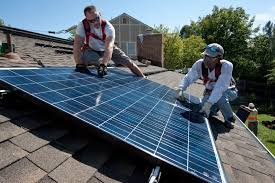The most effective method to Install a Ground Source Heat Pump in Your Home
In the event that you're contemplating installing a ground source heat pump in your home, you've come to the perfect locations. This sort of heating framework is gaining popularity for a variety of reasons, from cost-viability to increased solace. In any case, it requires somewhat more planning and thought than an ordinary heat pump. Whether you're changing from traditional radiators or underfloor heating to a ground source heat pump requires a touch of planning.
Before you install a ground source heat pump, you should decide the kind of ground circle and whether you want another channel framework. Initial, a home contractor will decide your heating and cooling needs. On the off chance that you're hoping to get state impetuses for diminishing your heating costs, they may direct a Manual J calculation to decide the amount of heating and cooling your home necessities. The contractor may also review your current ventilation work to decide how to best install the framework.
Whenever you've picked the kind of ground source heat pump you want, make sure to recruit a qualified installer. Make sure they're MCS-confirmed and have the appropriate training and experience. You can also expect the installer to explain how to appropriately care for your ground source heat pump. Finally, remember to finish up all the warranty and insurance structures and register your framework. It's easy to understand the reason why it's so important to have a qualified and experienced heating framework installed in your home.
The installation interaction is relatively straightforward. You'll have to prepare the indoor and open air parts. The installer will interface key components to the heat pump and commission it. You ought to also prepare the plant room or circle field before the installation. Along these lines, your installer will actually want to access these areas easily. The whole interaction takes somewhere in the range of three and four days. There are a few small costs included, yet the advantages far offset the expense.
You'll have to consider the number of individuals that live in your home and the size of the home. The heat pump size relies upon the quantity of occupants in your home. A qualified HVAC professional can assist you with deciding the size of the heat pump that's ideal for you. And recall: the lifespan of a ground source heat pump is usually twenty to a quarter century. While picking a heat pump, think about your climate, your financial plan, and your ideal savings.
A ground source heat pump involves water or earth as a source of heat during winter, and stores the dismissed heat in the mid year. Although they're more uncommon than air source heat pump, they are gaining popularity with cost-cognizant mortgage holders. Because the temperature beneath the ground remains the same 55 degrees underneath the frostline, a ground source heat pump can work all year round. You can try and pick a ductless indoor unit.
In the event that you're pondering installing a ground source heat pump in your house, you're perfectly positioned. Ground source heat pumps are exceptionally energy-proficient, and can bring down your month to month heating costs by as much as half. They can also be utilized as homegrown boiling water heaters and air molding frameworks. Not exclusively will they decrease your energy bill, however they'll also let loose some space in your utility room.




Comments
Post a Comment